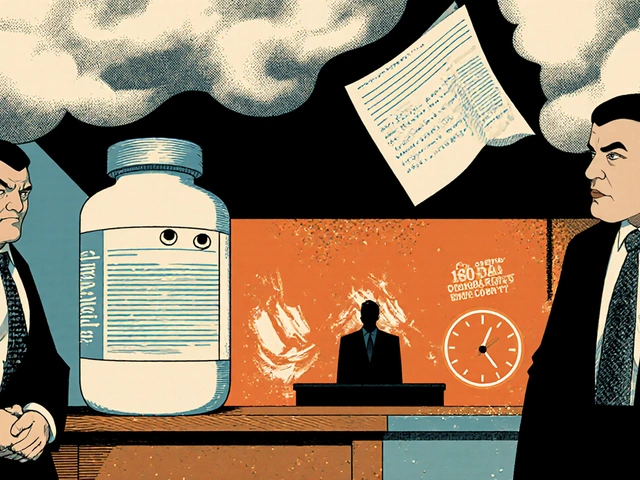People taking carbidopa-levodopa for Parkinson’s disease often worry about what it’s doing to their thinking and memory. Is it helping? Hurting? Or just sitting quietly in the background, doing nothing? The truth isn’t simple. Carbidopa-levodopa saves movement - it lets people walk, talk, and hold a cup again. But when it comes to the brain’s higher functions, the story gets messy.
How Carbidopa-Levodopa Actually Works
Levodopa is the active ingredient that crosses the blood-brain barrier and turns into dopamine. Dopamine is the chemical your brain uses to control movement. In Parkinson’s, dopamine-producing cells die off. Without enough dopamine, your body freezes up - tremors, stiffness, slow steps. Carbidopa doesn’t do anything in the brain. It just blocks levodopa from breaking down in your gut and bloodstream so more of it reaches your brain. Together, they’re a team: carbidopa clears the path, levodopa delivers the goods.
But dopamine isn’t just about movement. It’s also involved in attention, motivation, and memory. That’s why changing dopamine levels doesn’t just fix your gait - it can change how you think.
Does Carbidopa-Levodopa Cause Dementia?
No, carbidopa-levodopa doesn’t cause dementia. But it doesn’t stop it either. Dementia in Parkinson’s isn’t a side effect of the medication - it’s a progression of the disease itself. As Parkinson’s spreads beyond the motor areas of the brain, it starts hitting regions tied to memory, planning, and judgment. This is called Parkinson’s disease dementia (PDD). It usually shows up years after diagnosis, often after 10 or more.
Studies tracking people over 15 years show that about 80% of those with Parkinson’s develop dementia eventually. The timing varies. Some get it early. Others never do. The dose of levodopa doesn’t predict who will. What matters more is the underlying brain changes - Lewy bodies, shrinking cortex, tangled proteins - not the medication.
Still, people blame the drug. Why? Because when someone starts taking carbidopa-levodopa, they often begin noticing memory lapses around the same time. Coincidence feels like cause. But the real culprit is the disease, not the treatment.
Memory and Thinking: The Mixed Effects
Levodopa can have opposite effects on different parts of thinking. For some, it improves attention and mental speed. That’s because dopamine helps the prefrontal cortex - the brain’s control center for focus and decision-making. If your dopamine is too low, you might struggle to follow a conversation or remember why you walked into a room. Levodopa can fix that.
But for others, especially those with advanced disease, levodopa makes memory worse. Why? Too much dopamine in the wrong places. When dopamine floods areas that aren’t designed to handle it - like the hippocampus, where memories are stored - it can disrupt normal signaling. This is why some people on higher doses report confusion, hallucinations, or trouble recalling names.
A 2023 study from the University of Cambridge followed 214 people with Parkinson’s over two years. Those on higher daily doses of levodopa (over 600 mg) were 3.2 times more likely to show decline in verbal memory than those on lower doses. But their motor skills improved. So it’s a trade-off: better walking, worse remembering.

Who’s Most at Risk for Cognitive Side Effects?
Not everyone reacts the same. Some people can take 800 mg of levodopa a day and stay sharp. Others feel foggy at 200 mg. Why? Genetics, age, and brain health play big roles.
- People over 70 are more likely to develop confusion
- Those with mild cognitive impairment before starting levodopa are at higher risk
- People with a history of depression or anxiety show more mental side effects
- Those with Lewy body pathology (seen on brain scans) are more sensitive to dopamine fluctuations
If you’ve been on carbidopa-levodopa for years and suddenly feel foggy, it’s not necessarily the drug. It could be the disease advancing. But it’s worth checking.
What Can You Do About It?
You don’t have to choose between walking and remembering. There are ways to balance both.
First, work with your neurologist to find the lowest effective dose. Many people take more than they need because they’re afraid symptoms will come back. But higher doses don’t always mean better control - they just mean more side effects. A 2024 review in Neurology found that reducing levodopa by 25% in older patients improved attention without worsening movement in 68% of cases.
Second, monitor your timing. Levodopa works in pulses. It spikes and then drops. That rollercoaster can confuse the brain. Extended-release versions or adding a dopamine agonist (like pramipexole) can smooth out the ride. Some clinics now use continuous infusion pumps for advanced cases - they deliver levodopa slowly all day, reducing mental swings.
Third, combine medication with non-drug tools. Exercise boosts brain chemicals that protect memory. A 2022 trial showed that Parkinson’s patients who did 45 minutes of brisk walking three times a week improved their recall scores by 18% in six months. Cognitive training apps, like those from Lumosity or BrainHQ, can help too. They don’t cure dementia, but they keep your mind sharp longer.

When to Suspect Something Else
Not every memory problem is from levodopa or Parkinson’s. Other things can mimic it:
- Thyroid problems - low thyroid slows thinking
- Vitamin B12 deficiency - common in older adults, causes brain fog
- Sleep apnea - if you snore and wake up tired, your brain isn’t getting rest
- Depression - it can look exactly like dementia in older people
- Medication interactions - some blood pressure pills, antihistamines, or sleeping aids make memory worse
If your memory drops suddenly, or you start forgetting how to use a phone or pay bills, don’t assume it’s just the disease. Get blood tests. Check your sleep. Review all your meds with your doctor. Sometimes the fix is simple: stop a pill, start a supplement, treat sleep apnea.
Real Stories, Real Trade-Offs
Marjorie, 76, from Bristol, started levodopa in 2018. Her hands shook so badly she couldn’t button her coat. After two weeks, she could tie her shoes again. But by 2022, she started forgetting names of her grandchildren. Her doctor lowered her dose slightly and added a low-dose antidepressant. Her memory didn’t get better - but her mood did. And she stopped feeling so overwhelmed.
David, 68, took high doses for years. He was walking well but kept getting lost driving to the store. His neurologist switched him to a continuous gel pump. Within months, his confusion cleared. He could remember where he parked again.
These aren’t outliers. They’re normal. The goal isn’t to eliminate levodopa. It’s to use it wisely.
Final Takeaway: It’s Not the Drug - It’s the Balance
Carbidopa-levodopa doesn’t cause dementia. It doesn’t erase memory. But it can tip the scales in a brain already under stress. The key is personalization. What works for one person can hurt another. Your brain isn’t just a motor system - it’s a thinking machine. Treating Parkinson’s means treating both.
If you’re on this medication and worried about your mind, talk to your doctor. Don’t stop. Don’t guess. Ask for a cognitive check-up. Get your dopamine levels mapped. Explore alternatives. And remember: the goal isn’t to be perfect. It’s to live well - with movement, with memory, with meaning.
Does carbidopa-levodopa make dementia worse?
No, carbidopa-levodopa doesn’t cause or directly worsen dementia. Dementia in Parkinson’s is caused by the disease spreading to memory areas of the brain. However, high doses of levodopa can sometimes make confusion or memory lapses more noticeable in people who are already at risk, due to dopamine imbalance in non-motor brain regions.
Can lowering my levodopa dose improve my memory?
Yes, in some cases. If you’re on a high dose and experiencing brain fog, confusion, or trouble remembering, reducing the dose - under medical supervision - can improve cognitive clarity. Studies show that up to two-thirds of older patients maintain good motor control even after a 20-30% dose reduction.
Are there alternatives to carbidopa-levodopa for people with memory issues?
Yes. Dopamine agonists like pramipexole or ropinirole can be used alone or with lower levodopa doses. They act longer and cause fewer dopamine spikes, which can reduce mental side effects. For advanced cases, Duodopa (levodopa gel infusion) or MAO-B inhibitors like rasagiline may offer smoother control with less cognitive disruption.
How do I know if my memory problems are from the medication or the disease?
Sudden changes - like forgetting how to use a familiar device or getting lost in your own neighborhood - are more likely due to disease progression. Gradual forgetfulness, like misplacing keys or blanking on names, can be medication-related. A cognitive assessment by a neurologist can help distinguish between the two. Blood tests and sleep studies may also reveal other causes.
Should I stop taking carbidopa-levodopa if I’m worried about memory loss?
Never stop without talking to your doctor. Stopping suddenly can cause dangerous withdrawal symptoms like fever, muscle stiffness, and confusion - even worse than dementia. Instead, ask for a review of your dose, timing, and possible alternatives. There are ways to protect your memory without losing your ability to move.
If you’re managing Parkinson’s and worried about your mind, you’re not alone. The right balance is possible - and it starts with asking the right questions.









Been on this med for 6 years now. My hands don’t shake anymore but I forget where I put my keys 3 times a day. Guess that’s the trade-off. Not mad, just real.
My dad had the same thing. He said the walking was worth the fog. I believe him.
LOL so the drug that lets you walk is the same one that makes you forget your own name? Classic american healthcare. We fix the body but break the brain. I mean come on. We got a pill for everything except common sense. My cousin took this and started calling his dog by his ex-wife’s name. Not a joke. I swear to god.
Good breakdown. A lot of people panic when they start noticing memory slips, but you’re right - it’s often the disease, not the drug.
I’ve seen patients reduce their levodopa by 25% and not only keep their mobility, but actually think clearer. It’s not about stopping the med - it’s about tuning it. Like a guitar. Too tight, it snaps. Too loose, it sounds wrong.
And don’t skip the sleep and exercise part. Those are the real MVPs.
OMG YES!!! I’ve been screaming this from the rooftops - dopamine isn’t just for MOVEMENT!!! It’s for motivation, focus, memory - ALL OF IT!!!
My mom went from needing help to stand to dancing at my wedding… but then she forgot my birthday. Twice. I cried. But I also hugged her harder. This isn’t just a movement disorder - it’s a whole brain revolution. And we need to treat it like one!!
Also, LUMOSITY WORKS. I swear on my cat’s life. 🐱🧠
I don’t know… I just feel like… maybe… the whole dopamine thing… is being oversimplified? I mean, like, sure, it’s about movement… but what about serotonin? And acetylcholine? And what about the gut-brain axis? Nobody talks about that. And why are we always blaming the brain? What if it’s the liver? Or the kidneys? Or… I don’t know… the moon? I’m just saying…
In India we don’t use this drug. We use yoga and turmeric. My uncle had Parkinson’s. He walked again after 3 months of morning walks and neem leaves. You think science is better? Think again.
Just had my neurologist lower my dose from 750mg to 500mg. Two weeks later? I remembered my wife’s birthday. AND I didn’t cry. 🥲
Also, I started walking my dog every day. He’s a 12-year-old pug. We go slow. But I see the trees now. I see the sky. I remember what the wind feels like.
This isn’t just about pills. It’s about living. And sometimes… less is more. 🙏
You don’t have to choose between moving and remembering. You just need to find your rhythm. It’s not perfect. But it’s yours. And that’s enough.